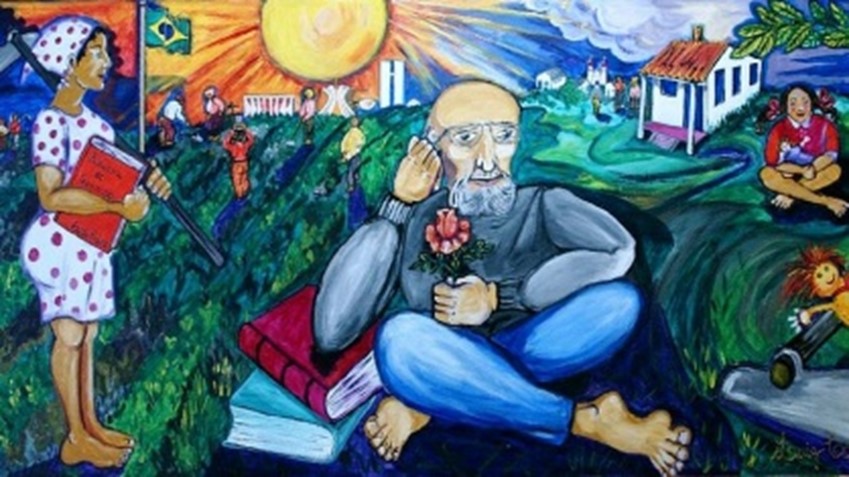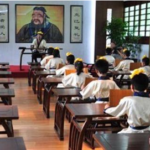Débora Mazza, Professora Doutora do Departamento de Ciências Sociais na Educação, Faculdade de Educação, Universidade Estadual de Campinas (UNICAMP), Campinas, SP, Brasil. Pesquisadora PQ/CNPq.
Luana Costa Almeida, Professora Adjunta do Departamento de Teorias e Práticas Pedagógicas (DTPP) da Universidade Federal de São Carlos (UFSCar), São Carlos, São Paulo, Brasil.

Paulo Freire’s centenary, celebrated in 2021, is enhanced in the celebratory session| named as Paulo Freire 100 years at the Educação & Sociedade journal, which brings, among others, papers such as Paulo Freire na Unicamp: o ranço autoritário e o verniz democrático (MAZZA, 2021) and Paulo Freire: presente! It is a bibliographic survey at the “Educação & Sociedade” journal (ALMEIDA, 2021) that presents and analyzes different facets related to the author’s production and life.
The return of Paulo Freire and his family to Brazil, in 1980, occurred after 16 years of his exile that was imposed by the civil-military coup in 1964. Hiring difficulties and struggles for an institutional recognition at Unicamp of his engaged and extensionist work, first in Brazil then in Americas (Chile and the United States), in Europe (Geneva) and in countries recently freed from the colonial yoke (Africa), have shown some strained relationships between a recent authoritarian past that did not go away and a new democratic present that was slow to arrive.
Mazza (2021), based on an analysis of documentary sources of this process at Unicamp, has explained that the institutionalization of universities and of Unicamp as well is determined by uneven moves both on nurturing freedom of expression and didactic, political, administrative and financial autonomy and in resurgence of bureaucratic protocols and corporatism strengthening that hinders flows of innovation, changes and plural journeys. The difficulties of hiring Paulo Freire at the university have exposed social and political projects in dispute that cover themselves of institutional normative interests that range from a critical, popular and democratic perspective and actions that prioritize tradition, bureaucratic rites and a model path to build professors’ careers in higher education.

Image: Luiz Carlos Cappellano/Public Domain.
It is a process that, although it has required some effort to assimilate Freire’s contributions at the university itself, does not measure his recognition outside it. The author’s presence becomes peremptory when investigative productions in humanity area are recovered, since his importance is recognized inside and outside academic spaces. An aspect evidenced in a mapping carried out by Almeida (2021) concerning Freire’s researches and concepts used in papers published at the complete issues of Educação & Sociedade, from 1978 to 2020. It is possible to understand how the author made himself present based on the produced survey, more than Freire’s legacy rescue, and it is deservedly recognized in the national and international educational debate. Understanding how Paulo Freire returned to Brazil, to Unicamp and his presence in the production registered at Educação & Sociedade journal, means more than paying homage to this relevant icon in Brazilian social and educational thought, it means some struggle feedback.
Those several possibilities of looking at educational issues by Freire’s perspective contribute to changes that allow relearning Brazil nowadays, as Freire himself has suggested on his arrival from exile, since it is necessary not only unveil it, but to act out in it.
May Freire’s presence along the national history, at Unicamp and registered in the educational debate lately at Educação & Sociedade journal help to interpret the current social and political context, and, in addition, allow re-feeding the active hope processes: the “esperançar”. In the symbology of Paulo Freire’s centenary, may the author’s legacy be continued: the struggle to build a fairer world, free from oppression, with a today “unknown viable” world that will make a better society for the present and future.
Paulo Freire: Present!
In the following video, authors Débora Mazza and Luana Costa Almeida show the importance of Paulo Freire’s legacy for education.
External links
Educação e Sociedade – ES: www.scielo.br/es
Facebook Educação e Sociedade: https://www.facebook.com/ES.cedes/
LinkedIn Educação e Sociedade: www.linkedin.com/in/educação-e-sociedade
Profa. Dra. Luana Costa Almeida – Departamento de Teorias e Práticas Pedagógicas: https://www.dtpp.ufscar.br/institucional/docentes/luana-costa-almeida
Twitter Educação e Sociedade: https://twitter.com/ES_cedes
To read the articles, access
ALMEIDA, L.C. Paulo Freire: Presente! levantamento bibliográfico em Educação & Sociedade. Educ. Soc. [online]. 2021, vol. 42, e252600 [viewed 9 December 2021]. https://doi.org/10.1590/ES.254030. Available from: https://www.scielo.br/j/es/a/FhCRccw4cxBhL7hCJDg9dcJ/?lang=pt
MAZZA, D. Paulo Freire na Unicamp: O ranço autoritário e o verniz democrático. Educ. Soc. [online]. 2021, vol. 42, e252600 [viewed 9 December 2021]. https://doi.org/10.1590/ES.2526000. Available from: https://www.scielo.br/j/es/a/mkFcPSNHmSrNmgGPZ6pJdNh/?lang=pt#
Como citar este post [ISO 690/2010]:


















Recent Comments